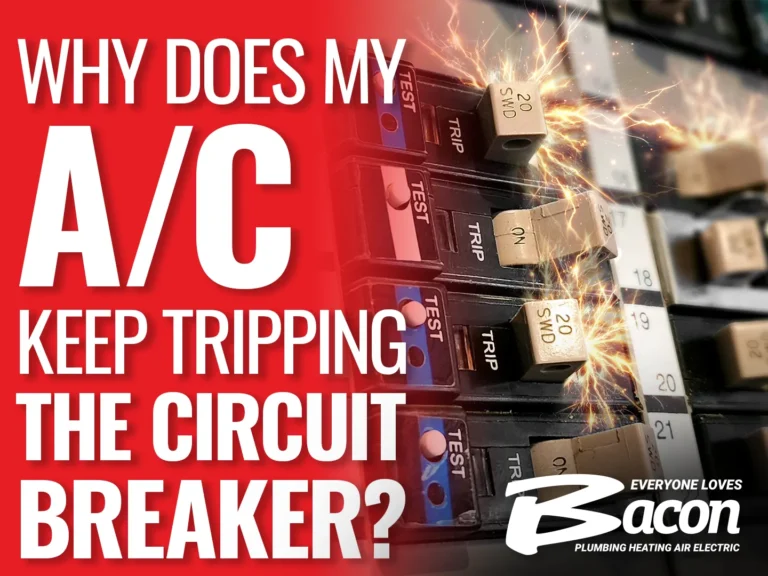Your electrical panel is a vital, if sometimes mysterious, part of your home’s electrical system. It’s usually located in a garage, basement, utility closet, or another place you may not often think about. When your electrical panel is working correctly, it’s easy to forget. But what do you do when circuits start tripping, your power use goes up, or other strange electrical issues start to arise?
At Bacon Plumbing Heating Air Electric, we know everything there is to know about electrical panels, also called breaker boxes or circuit panels. We’re here to answer some of the top questions we get from Dallas-Fort Worth homeowners about these unassuming yet mighty home systems.
What does an electrical panel consist of?
Your electrical circuit breaker panel is like a hub for all the different appliances, rooms, and outlets in your home, distributing power from your main power lines to everywhere you need it. They control the flow of power to everything from your ceiling fans to your CPUs. It consists of a few main components, including two types of circuit breaker:
Branch Circuit Breakers: When you open the panel, the first thing you’ll see is two long rows of breakers, known as single pole breakers. Breakers are switches that turn off or “trip” when a short circuit or surge threatens to damage the wiring. Each breaker is connected to a specific area of your house, such as the laundry room, living room, or kitchen.
Main Breaker: Above these individual breakers, you’ll notice one much larger switch, usually a double pole breaker (taking up two slots). This is your main breaker—flipping it turns off power to all the circuits in your house. It should also be marked with the panel’s total amperage (100, 150, or 200 amps).
Bus Bars: These bars are usually hidden behind a metal plate so you don’t accidentally touch them. They assist in moving power from the main power lines, through your appliances, and back into the power grid.
How long does an electrical panel last?
Electrical panels typically last for anywhere from 25 to 40 years. People usually don’t think about replacing them until a major problem occurs, but there are a few reasons to have it inspected:
- You live in an older home (25+ years)
- Your circuit breakers are tripping frequently
- Your home has a fuse box (an outdated method of power distribution)
- You notice heat or strange smells coming from your electrical panel
- Your home has experienced water damage anywhere near the panel
- You hear buzzing, humming, clicking, or any other noises coming from the panel or the outlets in your home
Should I upgrade my electrical panel?
Another reason to consider replacing your electrical panel is if you’re making smart electrical upgrades, adding an electric vehicle charging station, or simply using more electricity than the panel was designed for. Today’s homes and the appliances within them require significantly more power than they used to. For many homeowners, the standard 100 amps simply isn’t going to be enough, especially if you work from home or use many powerful electronics.
A smart panel upgrade can prevent electrical fires, improve your energy efficiency, and provide more consistent power to your home. Many Dallas homeowners are turning to whole-house energy management systems like Bacon’s Pure Energy™ for maximum energy savings plus real-time surge protection against Texas’s most unpredictable weather.
Can a homeowner replace electrical panels?
Unless you yourself are a master electrician, you need to call a professional to replace your electrical panel or repair electrical wiring. Many YouTube videos out there would have you believe that DIY electrical repairs are quick and easy, but the truth is that you’ll actually save time, money, and potentially your life by handing over the reins to a trusted technician. Electrical safety is nothing to take lightly!
What should not be touched in an electrical panel?
A breaker box has many parts that could shock you, including the bus bars, any bare metal parts, any damaged or burnt parts, and the main black cable that runs to your panel. The only parts that are safe to touch are the individual circuit breakers. Still, it’s always best to wear rubber gloves any time you interact with the panel.
Even if your main breaker is switched off, power is always still flowing through the main electrical wire unless there is a total power outage in your neighborhood. Always treat your panel with caution, and call a professional if you have to do anything more than flip a breaker back on.
How much does it cost to replace an electrical panel?
Prices for electrical panel replacement in Dallas-Fort Worth vary based on the amperage your home requires, the number of panels in your home, and whether you’re interested in a smart electric panel upgrade, among other factors.
At Bacon, we provide upfront, flat-rate pricing for all electric repairs before work begins so you’ll always know exactly what to expect. And, once your repair or installation is complete, we guarantee our work 100%. If you’re interested in learning more about how much an electrical panel repair or replacement will cost for your home, give us a call today!
Licensed & Insured Electrical Repair Services in Dallas-Fort Worth, TX
At Bacon Plumbing Heating Air Electric, we’re your home electric experts, dedicated to treating all our customers like family. That means hiring only true professionals with experience, integrity, and skill. We’re available 24 hours a day, 7 days a week to get your emergency repair or home improvement job done right. To schedule your electrical service, call (469) 864-7538 or contact us online!



